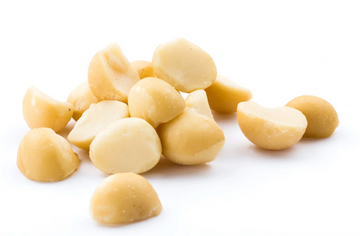The Origins and History of Macadamia Nuts
What are macadamia nuts? These premium tree nuts are native to Australia and belong to the Proteaceae family. The macadamia tree was first scientifically described by John Macadam, a Scottish-Australian botanist, which is how these nuts received their name. There are two main commercial species: Macadamia integrifolia and Macadamia tetraphylla, both producing the rich, creamy nuts we know today.
The macadamia nut tree thrives in subtropical climates and can live for over 100 years, making it a sustainable crop. Originally called the "Queensland nut" by early settlers, these nuts have become one of the world's most prized tree nuts due to their exceptional taste and nutritional profile.
Understanding the Macadamia Nut's Unique Characteristics
The macadamia stands out among other nuts due to its distinctive round shape and incredibly hard shell. Each nut contains a creamy, white kernel that's rich in healthy fats and has a naturally buttery flavor. Unlike many other nuts, the macadamia has one of the highest fat contents, with approximately 75% of its calories coming from beneficial fats.
Raw macadamia nuts have a subtle, sweet flavor that intensifies when roasted. The texture is uniquely smooth and creamy, making them perfect for both snacking and culinary applications. This premium nut requires specialized equipment to crack due to its extremely hard shell, which is why they're often more expensive than other tree nuts.
Nutritional Powerhouse: What Makes Macadamia Nuts Special
When examining what are macadamia nuts from a nutritional standpoint, they're truly exceptional. These nuts are packed with monounsaturated fatty acids, particularly palmitoleic acid, which supports heart health and may help reduce inflammation. The nutrition facts reveal that macadamias contain essential nutrients including vitamin E, which acts as a powerful antioxidant protecting cells from oxidative damage.
The healthy fats in macadamias include both monounsaturated and some saturated fat, creating a balanced profile that supports various bodily functions. These nuts also provide dietary fiber, which promotes gut health and helps maintain stable blood sugar levels. The antioxidants present in macadamias work synergistically with other nutrients to provide comprehensive health benefits.
Health Benefits and Nutritional Impact
Eating macadamia nuts regularly can contribute to improved cardiovascular health due to their high content of healthy fats. The monounsaturated fatty acids help reduce bad cholesterol levels while supporting good cholesterol. Research suggests that incorporating macadamia nuts into your diet may help manage metabolic syndrome and support overall heart health.
The fiber content in macadamias aids digestion and promotes gut health by feeding beneficial bacteria. The combination of healthy fats, fiber, and protein helps regulate blood sugar levels, making these nuts an excellent choice for sustained energy. The essential nutrients found in macadamias, including various antioxidants, support immune function and may help reduce inflammation throughout the body.
Culinary Applications and Food Pairings
Macadamia nuts are incredibly versatile in the kitchen. Roasted macadamia nuts develop a deeper, more complex flavor that pairs beautifully with both sweet and savory dishes. They complement white chocolate perfectly, creating classic combinations found in cookies and confections. Dark chocolate macadamia nuts offer a sophisticated flavor profile that balances rich cocoa with creamy nuttiness.
These premium nuts work wonderfully in mixed nuts assortments, adding richness and texture variety. Chopped macadamia nuts make excellent toppings for salads, yogurt, or oatmeal mixed with dried fruit and chia seeds. The creamy texture makes them ideal for creating smooth macadamia nut butter, which can be used as a spread or ingredient in various recipes.
Processing and Product Varieties
Macadamia nuts are available in several forms to suit different preferences and uses. Raw macadamia nuts offer the purest flavor and maximum nutritional benefits, while roasted versions provide enhanced taste and crunch. Macadamia nut oil is extracted from the nuts and serves as a premium cooking oil with a high smoke point and neutral flavor.
Macadamia nut butter has gained popularity as an alternative to traditional nut butters, offering a uniquely creamy texture and rich taste. Some processors create flavored varieties, incorporating ingredients like sea salt or combining them with other nuts like Brazil nuts to create gourmet mixed nuts products.
Storage and Safety Considerations
To store macadamia nuts properly, keep them in an airtight container in a cool, dry place. Due to their high fat content, they can become rancid if exposed to heat, light, or moisture for extended periods. Refrigeration can extend their shelf life significantly, while freezing can preserve them for up to a year.
For those with nut allergies, it's important to note that macadamias are tree nuts and can trigger allergic reactions in sensitive individuals. Anyone with a tree nut allergy should consult with healthcare providers before consuming macadamias. Cross-contamination during processing is also a consideration for those with severe allergies.
Comparing Macadamias to Other Premium Nuts
When compared to other premium nuts like Brazil nuts, macadamias offer a distinctly different nutritional profile and flavor experience. While Brazil nuts are known for their selenium content, macadamias excel in their monounsaturated fat content and unique palmitoleic acid presence. The creamy texture of macadamias sets them apart from the firmer texture of most other tree nuts.
The nutritional benefits of macadamias complement those found in other nuts, making them an excellent addition to a varied diet that includes different types of nuts and seeds. Their higher fat content means they're more calorie-dense than many other nuts, but the quality of these fats makes them particularly valuable for health-conscious consumers.
Incorporating Macadamia Nuts into Your Diet
Incorporating macadamia nuts into your daily routine can be both delicious and beneficial for your health. A small handful provides substantial nutritional benefits without excessive calories. They pair excellently with dried fruit for a balanced snack that combines healthy fats with natural sugars for sustained energy.
For those following specific dietary patterns, macadamias work well in ketogenic diets due to their high fat content and low carbohydrate profile. They can be ground into flour for baking, used whole in trail mixes, or processed into butter for spreading. The versatility of these nuts makes them easy to include in various meals and snacks throughout the day.
This comprehensive guide answers the question "what are macadamia nuts" while highlighting their unique characteristics, nutritional benefits, and culinary applications. These premium tree nuts continue to gain popularity worldwide due to their exceptional taste, impressive health benefits, and culinary versatility.





